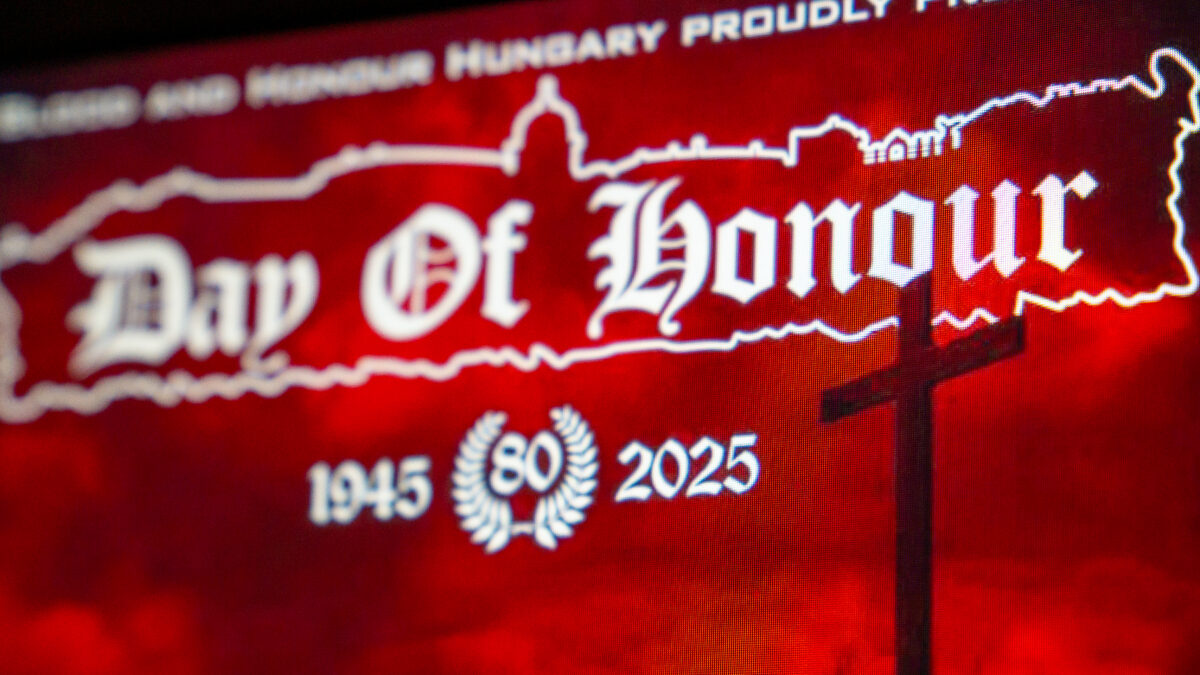YouTube is Autogenerating Videos for Songs Advocating the Expulsion of Muslims from India
The music videos themselves are low-budget. Just static images showing Hindu supremacist symbols and cut-out shots of singers. On occasion, they display photos of leaders of the Bharatiya Janata Party, or BJP, the Hindu nationalist ruling party in India. But the lyrics speak of the slaughter of Muslims and have been chanted at religious rallies, sparking violence.
These songs are part of a genre known as “Hindutva Pop”, named after a nationalist ideology associated with right-wing extremism that advocates for establishing India as a Hindu nation-state. And YouTube, one of the top music streaming platforms in the country, has helped this music expand its reach among young audiences.
YouTube not only hosts such songs; it also generates videos for them.
One YouTube-generated video is for a song by Hindutva singer Ved Prakash Shukla titled: “Jab Tak Hindu Rakt Hai Yogi Ji Har Bar Ayenge”, which translates to “Yogi will come to power till Hindu blood runs in our veins”. In the song, Shukla chants in Hindi: “We will write Jai Shri Ram with streams of blood”, invoking the Hindu deity Ram. In the 20th century, some Hindu nationalists co-opted Ram to push anti-Islamic fervour. As author and activist Harsh Mander wrote for Scroll, “remaking his gentle image from a symbol of righteousness, duty, compassion and devotion, into a wrathful combative warrior raging against the politically constructed “enemy within”. In 1992, a Hindu nationalist mob attacked and destroyed the 16th-century mosque, Babri Masjid, believed by a section of the Hindu community to be on the site of Ram’s birthplace. In 2020, Prime Minister Narendra Modi (a leader of the BJP) laid the foundation for the construction of a Hindu temple dedicated to Ram where the mosque once stood.
In recent years, Hindu mobs have used the slogan “Jai Shri Ram” (Hail Lord Ram) while carrying out violent attacks on minority communities. The video featuring Shukla’s song chanting the slogan—which was traditionally used as a greeting—has over 171,000 views. Yogi Adityanath, the man the song says will come to power, is a BJP leader and Chief Minister of Uttar Pradesh, an Indian state which has made headlines for violent crimes against Muslims. Adityanath is known for making inflammatory anti-Muslim statements. A 2011 documentary features a public speech where he says, “We have decided that if they [Muslims] capture one Hindu girl, we will capture at least 100 Muslim girls. If they kill one Hindu, we will kill 100.”
In another YouTube-generated video, Shukla sings: “Leave India if you are scared of saffron”. The Hindu right-wing has appropriated the colour saffron, which is often prevalent in demonstrations against Muslims. The video has more than 780,000 views.
The colour saffron holds special significance in Hinduism, writer Dhirendra Jha told Bellingcat. “Because religion becomes very important in the mobilisation of Hindus, religious symbols become very important,” he added while continuing that the saffron flag adopted by the Rashtriya Swayamsevak Sangh (RSS) is the same flag of the Peshwas from the 19th-century. RSS is a right-wing Hindu nationalist organisation associated with the BJP founded in 1925. The Peshwas were ministers in the Maratha Empire who belonged to the Brahmin community, the so-called highest caste in the Hindu caste system. “The question is why is it that saffron is so important in all these movements – it is essentially a religious symbol which has now become a political tool to a great extent for the Hindu right-wing in India.”
Both the songs in the above examples violate YouTube’s policy against promoting violence or hatred against individuals or groups based on religion. Yet the videos are credited as “Auto-generated by YouTube” in the description.
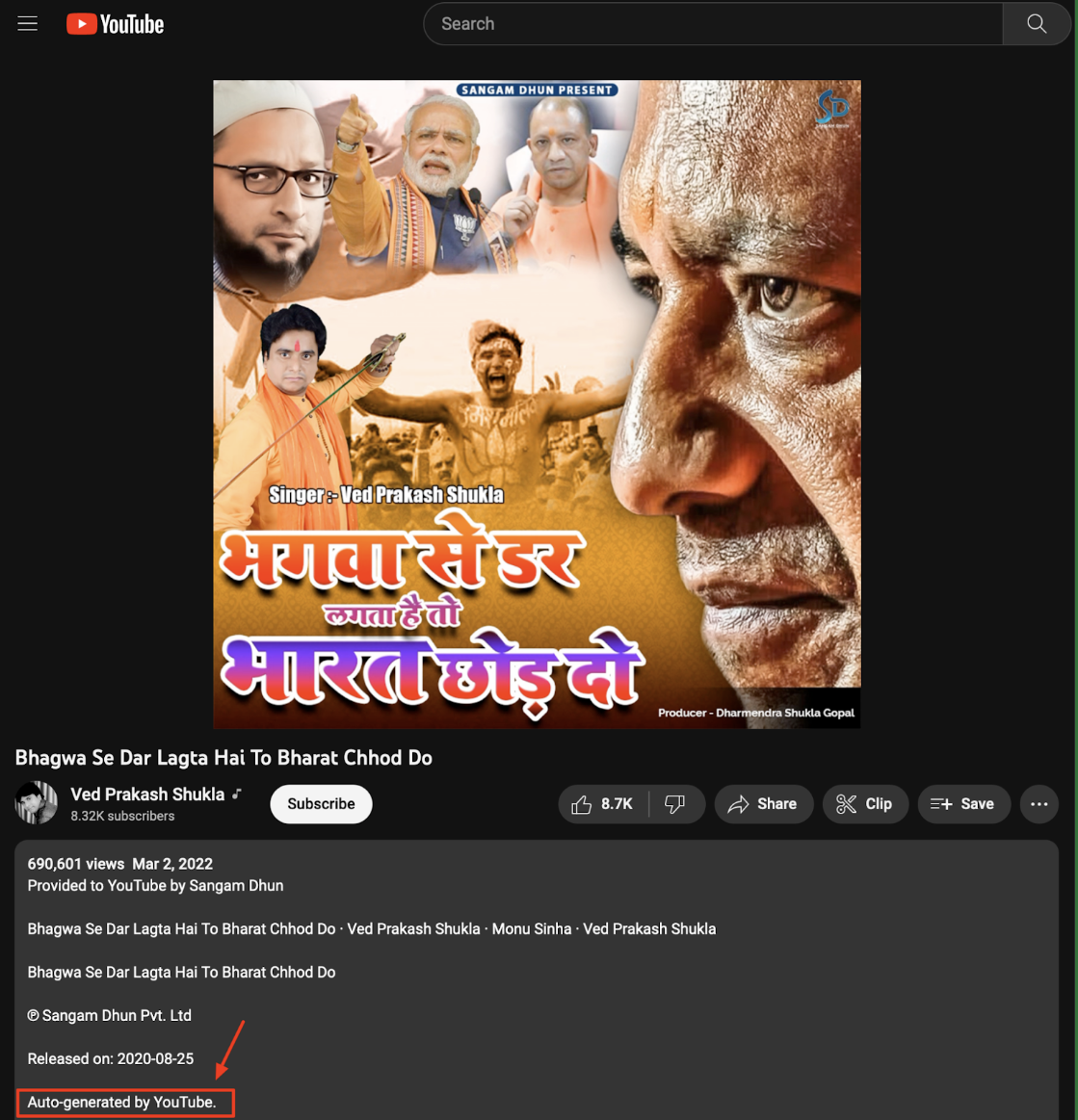
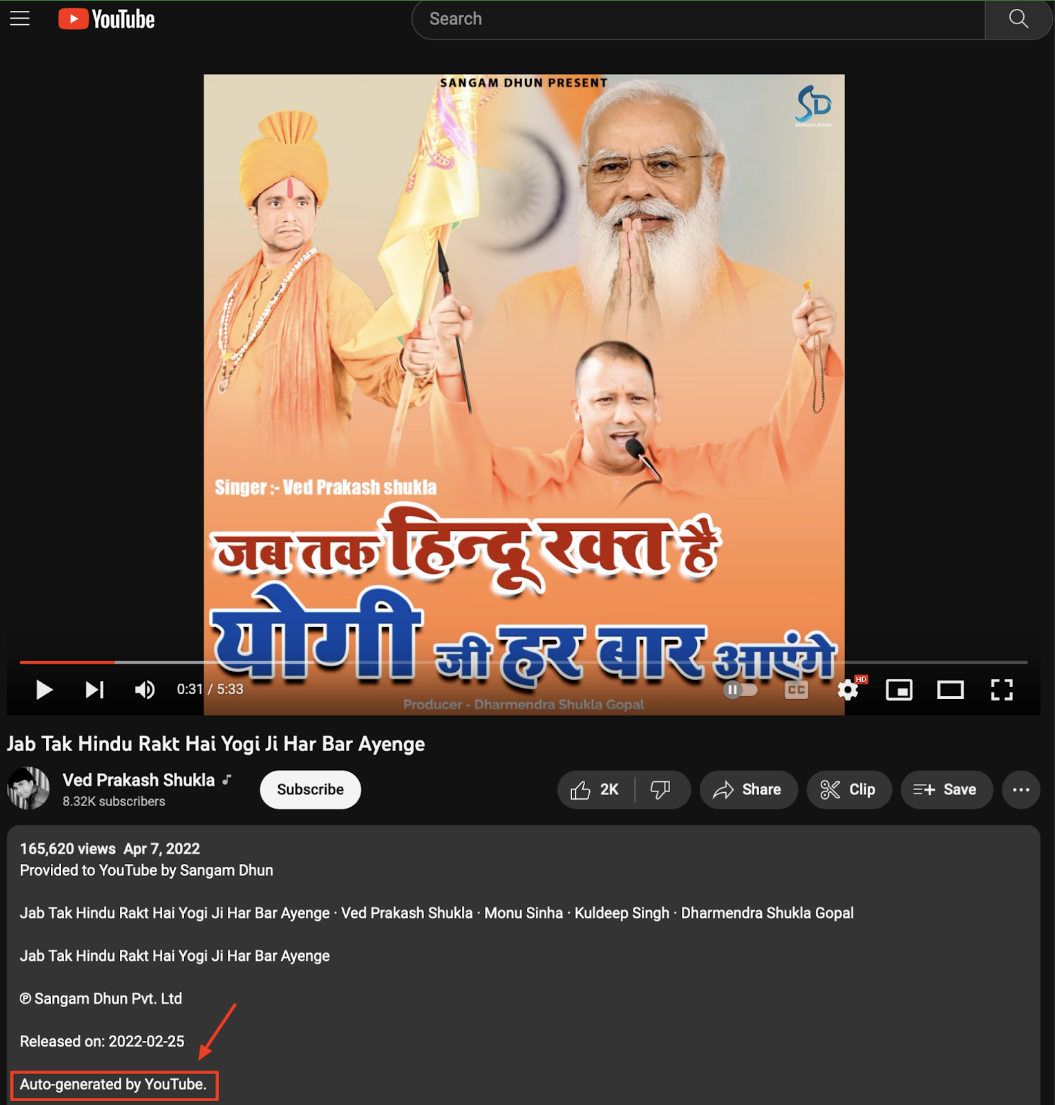
The platform uses the term “Auto-generated” since the videos are not uploaded directly by users. “YouTube auto-generates videos at scale [which it terms Art Tracks] for audio tracks delivered by record labels and distributors. Artists have to submit the recording, artwork and metadata to create Art Tracks,” a YouTube spokesperson wrote in an email statement to Bellingcat.
Bellingcat identified 114 videos across 54 channels generated for songs that promote discrimination — and in some cases outright violence — against Muslims in India, posted from May 2019 to September 2023. YouTube is also running advertisements on these videos, which have a combined view count of over 5.4 million. Seven of these songs were unavailable at the time of publication, one channel was terminated and another channel was blocked in India due to a legal complaint from the government. We collected the songs using YouTube’s Data API, scraping autoplay and manual search.
The songs have been categorised into “Hate”, those carrying speech in direct violation of YouTube’s policy, and “Fear”, which researchers at Indian Institute of Technology and Rutgers University define as speech that attempts to incite fear about a target community. Our dataset is not exhaustive due to the limitations of the API and restricting our search to only Hindi-language content. Many of the YouTube-generated tracks are in the Bhojpuri language.
“YouTube automates the creation of Art Tracks based on the values provided by the artist/ uploader,” wrote YouTube. These videos are released on the YouTube Music library and YouTube subsequently generates a “Topic channel” for the artist, populated with the artist’s songs, on the standard YouTube platform.
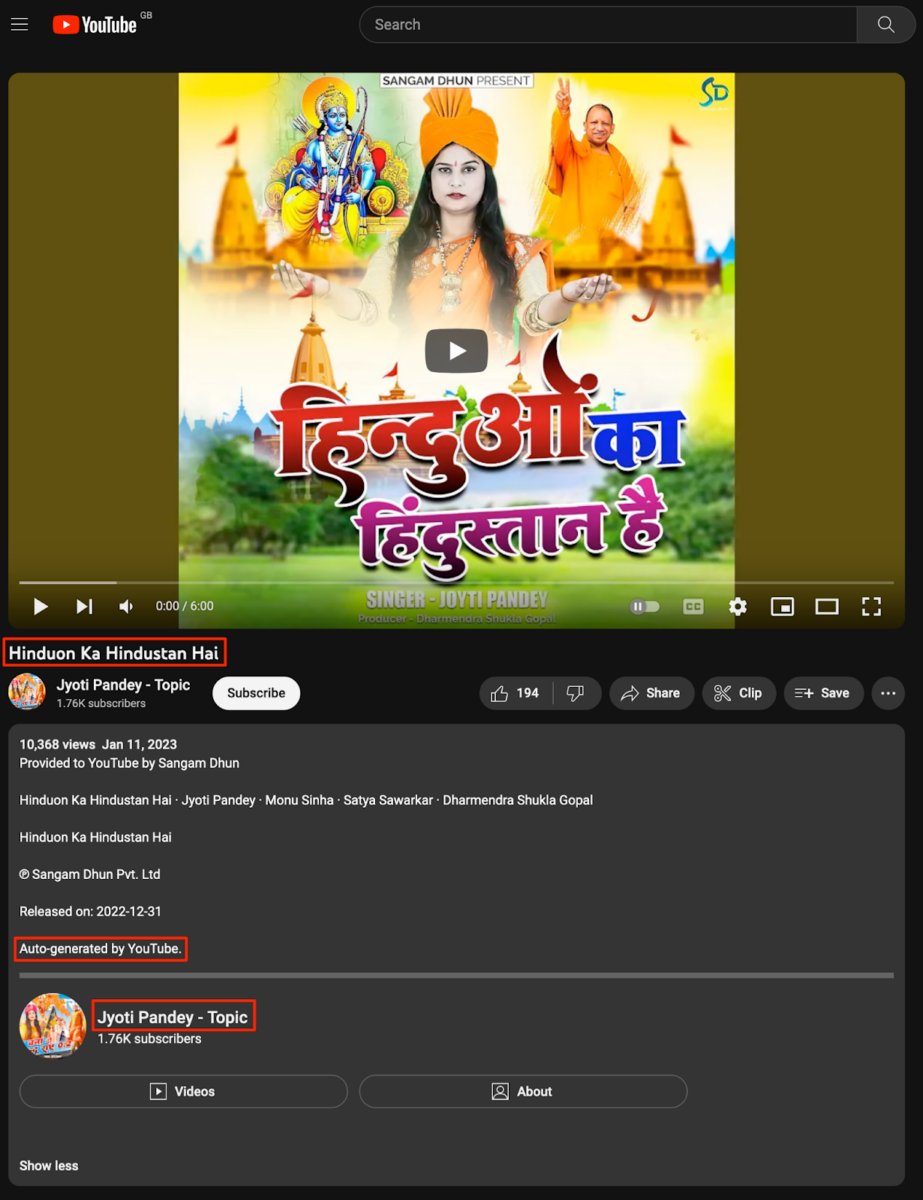
This automated approach allows YouTube to extend its music inventory while allowing users to listen to an artist’s entire discography. In 2015, a spokesperson for the platform told Vice, “As part of our deals with the music industry, we’ve licensed their other music that wasn’t yet on YouTube or didn’t have a music video. When we did that, we created auto-generated videos for them to bring their music easily to YouTube viewers everywhere.”
However, the platform’s ineffective content moderation system has allowed hateful content to slip through the cracks.
A YouTube-generated video for a song titled “Banayenge Mandir”, which translates to “We will build a temple”, referring to the construction of Ram Temple on the site of Babri Masjid, gathered over 70,000 views as of this writing. Last month, a mob of Hindu men climbed atop a mosque’s walls in the state of Karnataka, dancing to the song and singing the lyrics, “We will not rest till your (Ram’s) temple is built. We will take bullets or daggers to our chest”. In 2022, the song was played outside another mosque in Karnataka.
“We have strict policies prohibiting hate speech on YouTube, and don’t allow ads to run on our platforms that include or promote hateful content,” said a YouTube spokesperson, in a statement to Bellingcat. “We take this issue seriously and terminate channels and remove videos that violate our policies.”
The spokesperson further added that YouTube “prohibits ads from running alongside content that incites hatred against, promotes discrimination, disparages, or humiliates an individual or group of people.”
This policy extends to all content on YouTube, including titles of videos. But 49 YouTube-generated videos in our dataset with clear hateful or violent messages in the title were overlooked. “You must chant Jai Shri Ram if you want to live in India”; “We will chase and shoot you if you don’t chant Jai Shri Ram”; “Eradicate love jihad,” referring to an Islamophobic conspiracy theory, are some examples.
Business of Hate
Hate music has been used by Hindu nationalists since the early 1990s, the journalist and Narendra Modi biographer Nilanjan Mukhopadhyay told the Associated Press last year, noting cassette tapes featuring adapted versions of popular Bollywood songs were distributed to appeal to young people at the time. Hindutva pop has upgraded the approach for modern times, adding electronic beats and auto-tuned vocals to draw new generations into the nationalist fold.
One prominent music label and distribution company in our dataset is Sangam Dhun. Of the 114 videos we found, 42 were provided to YouTube by this company.
Sangam Dhun is owned by Dharmendra Shukla, the national president of a Hindu nationalist organisation that supported the BJP ahead of state elections in Uttar Pradesh in 2022.
Several songs by this channel carry anti-Muslim messaging that should be clear to Indian moderators. But it is unclear how many country-specific human moderators are employed by YouTube and the number of moderators specifically checking Hindi language content.
YouTube has long faced criticism for failing to adequately remove harmful content or explain the resources and processes it devotes to moderation, particularly for content in languages other than English. YouTube’s moderation policy says machine learning models flag “most categories of potentially violative content” to moderators. In May 2023, a US-based company that holds shares in YouTube’s parent company, Alphabet, submitted a shareholder’s proposal demanding that the companies explain how the inherent risks of content moderation – particularly concerning the most vulnerable groups – are being addressed.
The proposal states that the “intended consequences of online hateful and inciteful content are division, extremism, factionalism, and violence,” specifically calling out India and Sri Lanka, “where studies have found hateful messages about minority groups spread through Facebook, YouTube, Twitter and WhatsApp have led to targeted violence against them.”
That was seen in March when violence erupted across India during Ram Navami, which marks the birth of Ram. Over 20 people were injured in different parts after groups of Hindus marched through Muslim neighbourhoods waving saffron flags and swords as they danced and shouted along to anti-Muslim songs blasting from loudspeakers.
One of the songs with the lyrics, “If you want to live in India, you have to chant Vande Mataram (an ode to the motherland)”, was played outside a mosque in the state of Madhya Pradesh as hundreds of people in the crowd filled in the lyrics at every break in the music.
This song is available on YouTube. It is titled “Pukarti Maa Bharti” (Mother India is calling) and carries the “Auto-generated by YouTube” disclaimer. The site uploaded it automatically in October 2022 to a channel it created in the name of Ved Vyas, the singer.
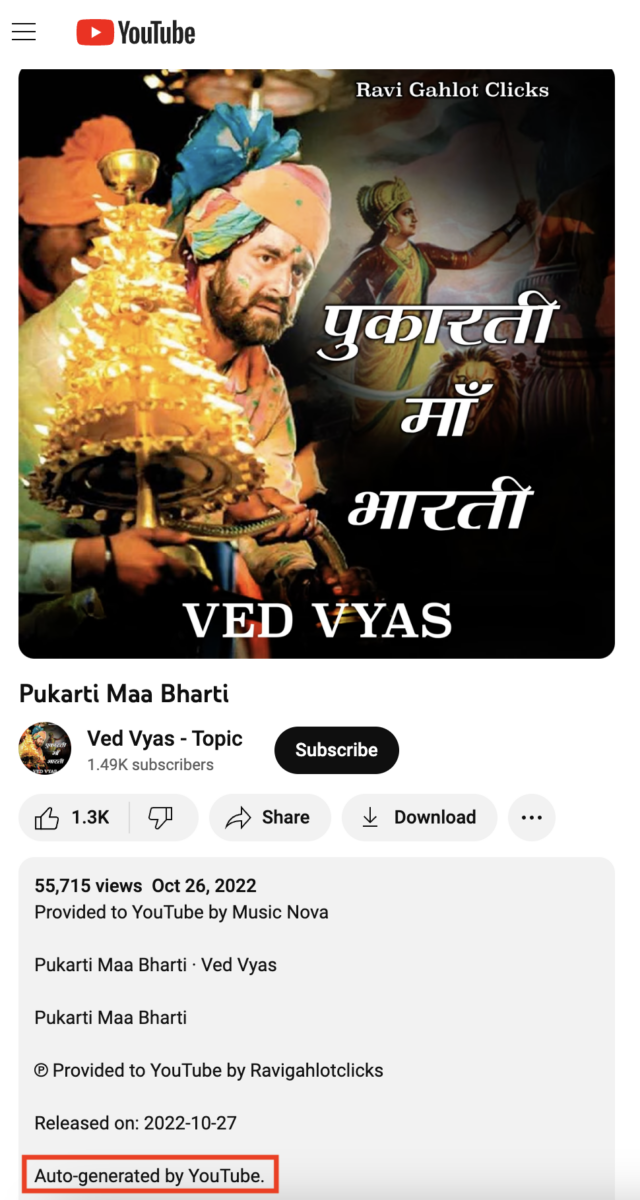
Paul Barrett, the deputy director of the Center for Business and Human Rights at NYU Stern, who recently co-authored a report on how YouTube spreads harmful content, told Bellingcat that YouTube invests far more resources into moderating content in the United States and other English-speaking markets, partly because it is easier, and partly because these markets tend to be more profitable.
“But the priorities are probably the opposite of what they ought to be,” Barrett said. “The priority should be to make sure that the technology is not misused in environments where politics and personal relations and other aspects of society are actually more volatile.”
In the opposition statement to the shareholder’s proposal, Alphabet said that it believes the company provides sufficient disclosures about YouTube’s policies and procedures and that it completes “extensive regulatory compliance work.”
Failure to Moderate
Sandeep Acharya, a prominent Hindutva singer, uses music to profess his love for India – a love often manifested in hate for Muslims.
In one of his songs, he threatens: “Those who interfere with the existence of Hindus, we will eradicate every single one of their homes.”
YouTube terminated Acharya’s personal channels twice for violating its policy on hate speech – in January 2022 and March 2023 – after Alt News and the Columbia Journalism Review inquired about his videos and its system of moderating content. But several YouTube-generated videos of Acharya’s songs are still up.
Another Hindutva singer, Varun Bahar, reappeared through YouTube-generated tracks after his own label took his music down.
In 2019, he released a song titled “Jo Na Bole Jai Shri Ram Bhej Do Usko Kabristan” (Those who don’t hail Lord Ram, send them to the graveyard), which contains the lyrics, “The traitors hiding at home will be skinned. One who doesn’t hail Lord Ram, their tongues will be slashed. Killing a traitor is not a sin. No jihadi Muslim is of worth.”
Bahar’s record label, Janta Musical and Pictures, removed the song from YouTube in 2019 after he and three others, including the label owner, were arrested and charged with promoting racial hatred through the song’s inflammatory lyrics. But since 2020, the song has been back on YouTube, with a YouTube-generated video, after a different music distribution company uploaded it.
In another instance, a local music label uploaded a song on Ram Mandir (temple) in 2019, carrying the following lyric: “Pigs perform dirty dances on the land of India”; pig being a Muslim dog whistle.
The singer, Ankit Gupta, told Bellingcat that the label later took down the song because it was “controversial”. The song re-appeared on YouTube as an Art Track in March 2023. (The other artists mentioned in this story did not reply to requests for comment).
“We got the audio re-uploaded through music distribution,” said Gupta, adding that a music distribution company from Benaras, a city in Uttar Pradesh, provided the recording to YouTube. “These songs get added to [an artist’s] Topic channel,” he said, and further explained that he merged his Topic channel with his official channel. Gupta’s YouTube-generated songs now appear on his official channel.
The upload from March 2023 now shows a “video unavailable” message. Possible reasons for such messages have been discussed on YouTube’s Community Page. Gupta, who was unaware that the video is no longer accessible, sent us a new link featuring the same song uploaded by YouTube two weeks before this article’s publication.
While the song hardly has any views – 29 to date – its reappearance shows that YouTube’s hate speech policy can be circumvented repeatedly.
YouTube’s ineffective moderation has emboldened singers who also seem to get around the platform’s policies through Art Tracks. But it also brings popularity.
When asked if YouTube has been beneficial, Gupta said: “Absolutely! Several companies approach me to make songs. If a new studio is inaugurated, they will contact me to make songs.”
Bellingcat is a non-profit and the ability to carry out our work is dependent on the kind support of individual donors. If you would like to support our work, you can do so here. You can also subscribe to our Patreon channel here. Subscribe to our Newsletter and follow us on Twitter here and Mastodon here.

